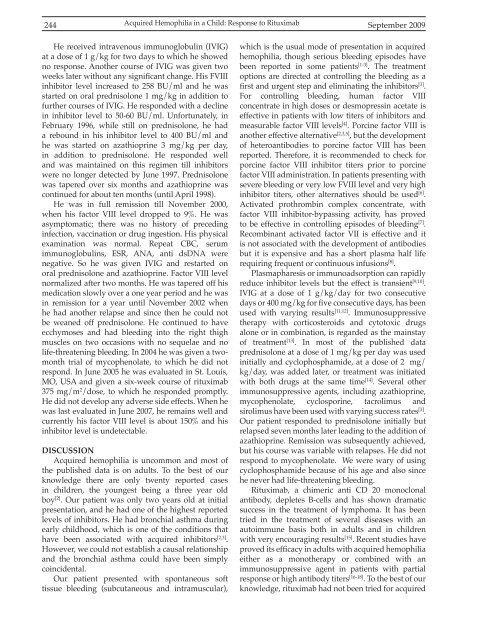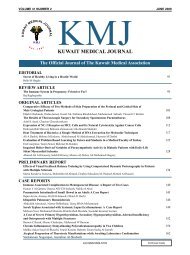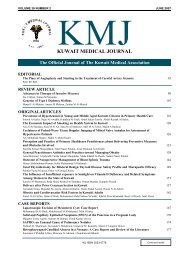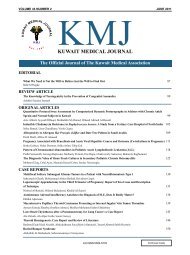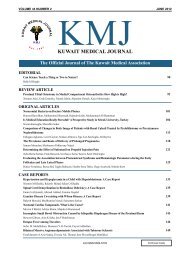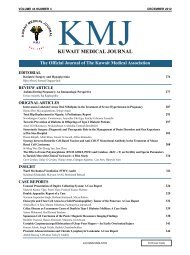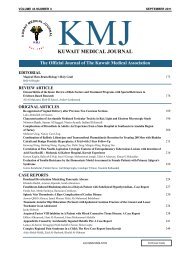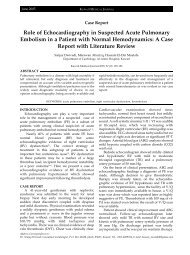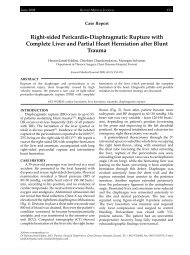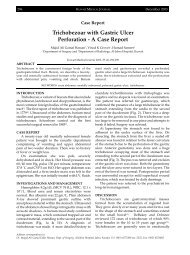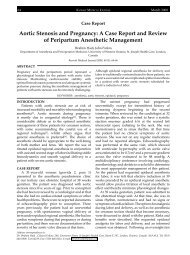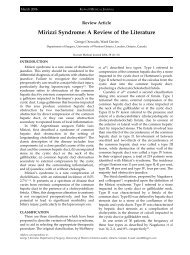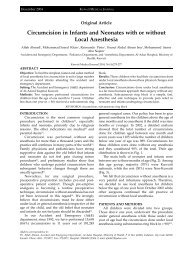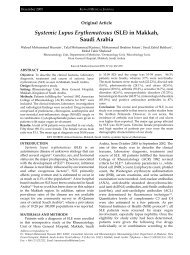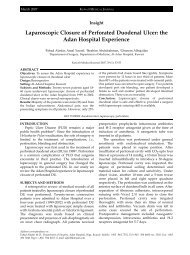Vol 41 # 3 September 2009 - Kma.org.kw
Vol 41 # 3 September 2009 - Kma.org.kw
Vol 41 # 3 September 2009 - Kma.org.kw
You also want an ePaper? Increase the reach of your titles
YUMPU automatically turns print PDFs into web optimized ePapers that Google loves.
244<br />
Acquired Hemophilia in a Child: Response to Rituximab<br />
<strong>September</strong> <strong>2009</strong><br />
He received intravenous immunoglobulin (IVIG)<br />
at a dose of 1 g/kg for two days to which he showed<br />
no response. Another course of IVIG was given two<br />
weeks later without any significant change. His FVIII<br />
inhibitor level increased to 258 BU/ml and he was<br />
started on oral prednisolone 1 mg/kg in addition to<br />
further courses of IVIG. He responded with a decline<br />
in inhibitor level to 50-60 BU/ml. Unfortunately, in<br />
February 1996, while still on prednisolone, he had<br />
a rebound in his inhibitor level to 400 BU/ml and<br />
he was started on azathioprine 3 mg/kg per day,<br />
in addition to prednisolone. He responded well<br />
and was maintained on this regimen till inhibitors<br />
were no longer detected by June 1997. Prednisolone<br />
was tapered over six months and azathioprine was<br />
continued for about ten months (until April 1998).<br />
He was in full remission till November 2000,<br />
when his factor VIII level dropped to 9%. He was<br />
asymptomatic; there was no history of preceding<br />
infection, vaccination or drug ingestion. His physical<br />
examination was normal. Repeat CBC, serum<br />
immunoglobulins, ESR, ANA, anti dsDNA were<br />
negative. So he was given IVIG and restarted on<br />
oral prednisolone and azathioprine. Factor VIII level<br />
normalized after two months. He was tapered off his<br />
medication slowly over a one year period and he was<br />
in remission for a year until November 2002 when<br />
he had another relapse and since then he could not<br />
be weaned off prednisolone. He continued to have<br />
ecchymoses and had bleeding into the right thigh<br />
muscles on two occasions with no sequelae and no<br />
life-threatening bleeding. In 2004 he was given a twomonth<br />
trial of mycophenolate, to which he did not<br />
respond. In June 2005 he was evaluated in St. Louis,<br />
MO, USA and given a six-week course of rituximab<br />
375 mg/m 2 /dose, to which he responded promptly.<br />
He did not develop any adverse side effects. When he<br />
was last evaluated in June 2007, he remains well and<br />
currently his factor VIII level is about 150% and his<br />
inhibitor level is undetectable.<br />
DISCUSSION<br />
Acquired hemophilia is uncommon and most of<br />
the published data is on adults. To the best of our<br />
knowledge there are only twenty reported cases<br />
in children, the youngest being a three year old<br />
boy [2] . Our patient was only two years old at initial<br />
presentation, and he had one of the highest reported<br />
levels of inhibitors. He had bronchial asthma during<br />
early childhood, which is one of the conditions that<br />
have been associated with acquired inhibitors [2,3] .<br />
However, we could not establish a causal relationship<br />
and the bronchial asthma could have been simply<br />
coincidental.<br />
Our patient presented with spontaneous soft<br />
tissue bleeding (subcutaneous and intramuscular),<br />
which is the usual mode of presentation in acquired<br />
hemophilia, though serious bleeding episodes have<br />
been reported in some patients [1-3] . The treatment<br />
options are directed at controlling the bleeding as a<br />
first and urgent step and eliminating the inhibitors [3] .<br />
For controlling bleeding, human factor VIII<br />
concentrate in high doses or desmopressin acetate is<br />
effective in patients with low titers of inhibitors and<br />
measurable factor VIII levels [4] . Porcine factor VIII is<br />
another effective alternative [2,3,5] , but the development<br />
of heteroantibodies to porcine factor VIII has been<br />
reported. Therefore, it is recommended to check for<br />
porcine factor VIII inhibitor titers prior to porcine<br />
factor VIII administration. In patients presenting with<br />
severe bleeding or very low FVIII level and very high<br />
inhibitor titers, other alternatives should be used [6] .<br />
Activated prothrombin complex concentrate, with<br />
factor VIII inhibitor-bypassing activity, has proved<br />
to be effective in controlling episodes of bleeding [7] .<br />
Recombinant activated factor VII is effective and it<br />
is not associated with the development of antibodies<br />
but it is expensive and has a short plasma half life<br />
requiring frequent or continuous infusions [8] .<br />
Plasmapharesis or immunoadsorption can rapidly<br />
reduce inhibitor levels but the effect is transient [9,10] .<br />
IVIG at a dose of 1 g/kg/day for two consecutive<br />
days or 400 mg/kg for five consecutive days, has been<br />
used with varying results [11,12] . Immunosuppressive<br />
therapy with corticosteroids and cytotoxic drugs<br />
alone or in combination, is regarded as the mainstay<br />
of treatment [13] . In most of the published data<br />
prednisolone at a dose of 1 mg/kg per day was used<br />
initially and cyclophosphamide, at a dose of 2 mg/<br />
kg/day, was added later, or treatment was initiated<br />
with both drugs at the same time [14] . Several other<br />
immunosuppressive agents, including azathioprine,<br />
mycophenolate, cyclosporine, tacrolimus and<br />
sirolimus have been used with varying success rates [3] .<br />
Our patient responded to prednisolone initially but<br />
relapsed seven months later leading to the addition of<br />
azathioprine. Remission was subsequently achieved,<br />
but his course was variable with relapses. He did not<br />
respond to mycophenolate. We were wary of using<br />
cyclophosphamide because of his age and also since<br />
he never had life-threatening bleeding.<br />
Rituximab, a chimeric anti CD 20 monoclonal<br />
antibody, depletes B-cells and has shown dramatic<br />
success in the treatment of lymphoma. It has been<br />
tried in the treatment of several diseases with an<br />
autoimmune basis both in adults and in children<br />
with very encouraging results [15] . Recent studies have<br />
proved its efficacy in adults with acquired hemophilia<br />
either as a monotherapy or combined with an<br />
immunosuppressive agent in patients with partial<br />
response or high antibody titers [16-18] . To the best of our<br />
knowledge, rituximab had not been tried for acquired


